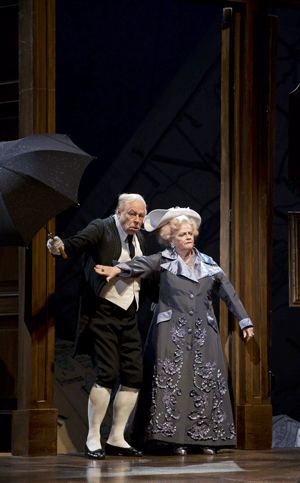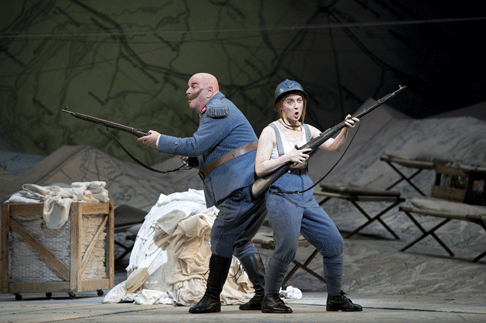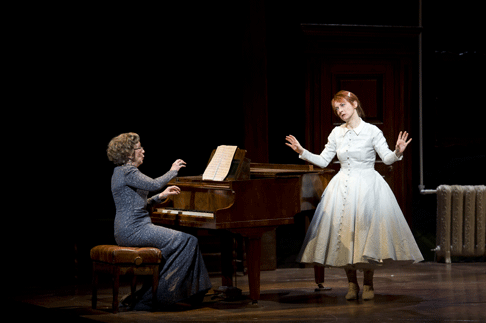25 Apr 2012
La Fille du Regiment, Royal Opera
The regiment marches onwards!

The regiment marches onwards!
Having conquered operatic stages in Europe and the US during the past five years, Laurent Pelly’s Tyrolean troopers/troupers have tramped back to London, with a sway and a swagger; the company’s stalwarts demonstrate their stamina while some of the leaders take a breather and make way for new recruits.
In particular, Natalie Dessay has resigned from the brigade. In 2010, on the occasion of the first ROH revival, I remarked that the role “is fast becoming a signature role — and indeed it is hard to imagine this production without Dessay”. However, Patrizia Ciofi more than proved me wrong: lacking Dessay’s manic agitation — a gamine hyperactivity that was often achieved at the expense of vocal finesse — Ciofi’s Marie is an altogether more rounded, and composed, character: an energetic, at times unreasonable adolescent, yes, but also a burgeoning young woman with hopes and dreams with which we can identify. Ciofi’s diction at times lacks lucidity; and her wide vibrato — especially at the top where it frequently forces the pitch upwards — is unfortunate in more sustained, ensemble passages.
 Ann Widdecombe as La Duchesse De Crackentorp and Donald Maxwell as Hortensius
Ann Widdecombe as La Duchesse De Crackentorp and Donald Maxwell as Hortensius
But, Ciofi has the high tessitura and breathtaking coloratura easily under her belt — or should I say braces — and has a rich, creamy tone. Hers is a Marie who makes us laugh and cry. Whether wobbling determinedly across the stage, buried beneath laundry mountains, or leaping aloft a potato bucket to entertain the troops, or being violently hoisted upside down or horizontal as she is ‘abducted’ by her newly found aunt, Ciofi retained her equanimity. Overall, she may lack some of Dessay’s hard-hitting punch but hers is a more genuine bel canto idiom.
Colin Lee has taken progressive but unceasing strides to the front lines: as Juan Diego’s understudy in 2007, he shared the role in 2010 and now stepped into the full glare of the spotlight. Certainly Lee has the vocal gifts and musical temperament to dispatch the infamous high Cs in ‘A mes amis’ — the last relished and sustained to substantial applause. And, in the yodelling leaps he revealed a heroic timbre to counter his previous hapless, bumpkin-esque persona, revealing the sincerity of Tonio’s affections. Although Lee may not possess the physical and vocal appeal of his predecessor in this production, he does have a confident, controlled elegance: his superbly shaped, long, legato lines pay detailed, intelligent attention to phrasing, and the effect is complemented by a focused vibrato, which was put to superb effect in his tender declaration of love, the Act 2 aria, ‘Pour me rapprocher de Marie’.
Returning as the Marquise de Birkenfield, Ann Murray relished the comic potential of her partnership with Donald Maxwell’s emasculated Hortensius. Her Act 1 account of the loss of her sister’s child is in danger of taking on an air of Miss Prism-esque farce — one half expects Lady Bracknell to pop up pompously pronouncing about perambulators and handbags. Indeed, one of the disadvantages of repetition is that wry comedy can become brutish slapstick: more Loony Tunes than Napoleonic rom-com. That said, as in 2010 Murray’s ‘singing lesson’ with Marie and Sulpice produced some of the finest musical and theatrical moments in the performance. And, Alan Opie’s Sulcipe was the warm embodiment of paternal indulgence — even when his feisty ‘daughter’ disowns him and declares her intent to find a regiment of ‘nicer daddies’.
 Patrizia Ciofi as Marie and Alan Opie as Sulpice Pingot
Patrizia Ciofi as Marie and Alan Opie as Sulpice Pingot
Stepping into Dawn French’s shoes as the Duchesse de Crackentorp, Ann Widdicome shares little with her predecessor except her girth — or rather, French’s former girth, given that the latter has recently revealed a new svelte figure. Hot from her Strictly and panto successes, Widdicome is clearly riding a popularist wave — rather surprising for one who made her name as a bastion of Tory/Victorian principled intolerance. However, politics aside, those who witnessed Widdicome’s Strictly ‘triumph’ will be aware that rhythm is not one of her fortes; she possesses none of French’s insouciant comic timing or improvisatory invention. Indeed, it even seemed quite a challenge for her to remember her lines. That said, self-referential surtitles — a bellowing ‘Order, Order!’, and many Strictly references — raised hilarity among the audience, so presumably the ROH management consider this casting well done. I probably deserve censure for failing to appreciate Widdicome’s willingness to laugh at herself and her ability to add to the frivolous fun.
Most pleasingly, the chorus are truly regimented, kept on a tight rein vocally and visually, relishing the mixture of musical self-discipline and the threat of dramatic — and military — mishap.
There is a lot of dialogue to get through, and thus the staging and visual appeal plays an important role in sustaining the audience’s attention: Chantal Thomas’s cartographical collage is both witty and engaging, while the distorted perspective of the Marquise’s château in Act 2 emphasises the bizarre nature of the dramatic development. Balletic dusting routines and a coup de théâtre tank for Tonio’s rescue mission help to overcome any potential dramatic longeurs.
Conductor Yves Abel leads the regimental company on a careful but precise campaign. There was much lovely playing from the ROH orchestra: in the introduction the horns were wonderfully warm and touching, complemented by well-shaped, emotive woodwind and string sectional playing. But, Abel’s tempi were, on the whole, rather slow and conservative — not quite right for the wild abandon on stage; and, he seemed to feel the need to signpost every comic moment with a knowing gesture.
Many chuckles derived from Agathe Mélinand’s surtitles. Indeed, the current Eurozone tensions gave an added frisson to the notion of an Italian soprano cast as a French girl, mangling an Italian aria, written by an Italian for a nineteenth-century French audience, performed in franglais-laden production, directed by a Frenchman, and translated for an English audience.
 Ann Murray as La Marquise De Berkenfeld and Patrizia Ciofi as Marie
Ann Murray as La Marquise De Berkenfeld and Patrizia Ciofi as Marie
In this context, the contemporary reception of Donizetti’s work is interesting: only two major composers of the age, Mendelssohn and Verdi, genuinely admired him, the former professing, in response to criticism of La fille, “I am afraid I like it. I think it very pretty — it is so merry! Do you know, I should like to have written it myself”. But others, notably Bellini and Berlioz, were less charitable, perhaps in awe and afraid of Donizetti’s prodigious output and adaptability. Indeed, Berlioz accused Donizetti “of treating us like a conquered country; one can no longer speak of the opera houses of Paris, but only of those of M. Donizetti”.
Pelly’s winning production has similarly conquered foreign stages, and there are undoubtedly many deserved victories ahead.
Claire Seymour